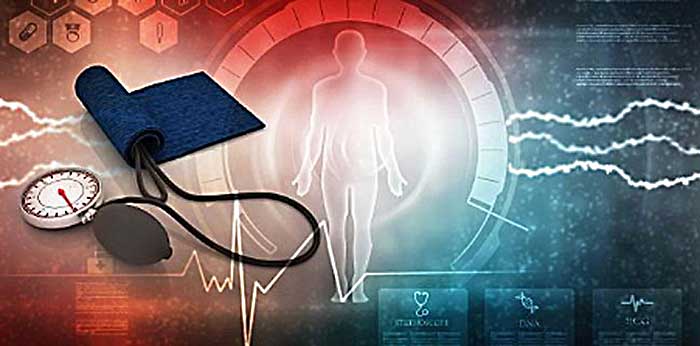What is Hypertension?
Hypertension (high blood pressure) refers to the pressure that blood applies to the inner walls of the arteries.
- Normal blood pressure: systolic (top number) equal to or less than 120 mmHg and diastolic (lower number) equal to or less than 80 mmHg
- Pre-hypertension: systolic 120-139 mmHg or diastolic 80-89 mmHg
- Hypertension:
Stage 1: systolic 140-159 mmHg or diastolic 90-99 mmHg Stage 2: systolic greater than or equal to 160 mmHg or diastolic greater than or equal 100 mmHg
Types of Hypertension
There are two types of hypertension:
- Essential hypertensionis most common and may be due to a number of causes including inheritance, kidney problems (from hypoxia, drugs, nutritional deficiency, malnutrition, infection, genetic factors) and neural activity.
- Secondary hypertensionis less common and is the result of a different underlying medical issue, such as kidney disease, oral contraceptives, pheochromocytoma, primary hyperaldosteronism, Cushing’s syndrome, sleep apnoea syndrome and coarctation of the aorta.

Risk factors
High blood pressure has many risk factors, including:
- Age
- Race- High blood pressure is particularly common among people of African heritage, often developing at an earlier age than it does in whites.
- Family history
- Being overweight or obese
- Not being physically active
- Using tobacco
- Too much salt (sodium) in your diet
- Too little potassium in your diet
- Drinking too much alcohol
- Stress
- Certain chronic conditions such as kidney disease, diabetes and sleep apnoea.
Co-relation of Obesity and Hypertension
The Framingham Heart Study, a famous study for 44 years, estimated that excess body weight (including overweight and obesity), accounted for approximately 26 percent of cases of hypertension in men and 28 percent in women. Obesity is associated with increased Visceral fat. Visceral fat increases LDL-cholesterol (bad cholesterol) levels in the blood and reduces HDL-cholesterol levels (good cholesterol). Due to this imbalance the cholesterol tends to clog the vessels- Atherosclerosis. This leads to increased blood pressure. Abdominal obesity with waist circumference greater than 90 cm for men and 80 cm for women is an indicator of increased Visceral Fat.
Studies have shown that weight-loss can lead to a significant drop in blood pressure. The Trial of Hypertension Prevention (TOHP), a 2-kg loss in weight over a 6-month period resulted in a decline of 3.7 mm Hg in systolic and 2.7 mm Hg in diastolic blood pressure. In addition, a 42% decline in the instance of hypertension was noted on this sample.

Complications of High Blood Pressure– The excessive pressure on your artery walls caused by high blood pressure can damage your blood vessels, as well as organs in your body. The higher your blood pressure and the longer it goes uncontrolled, the greater the damage. Uncontrolled high blood pressure can lead to complications including:
- Heart attack or stroke
- Aneurysm
- Heart failure
- Weakened and narrowed blood vessels in your kidneys can affect their function
- Thickened, narrowed or torn blood vessels in the eyes can result in vision loss.
- Metabolic syndrome. This syndrome is a cluster of disorders of your body’s metabolism, including increased waist circumference; high triglycerides; low high-density lipoprotein (HDL) cholesterol, the “good” cholesterol; high blood pressure and high insulin levels. These conditions make you more likely to develop diabetes, heart disease and stroke.
- Trouble with memory or understanding
- Dementia
How to keep that extra weight at bay and fight High BP
- Diet-
A nutritious diet with calorie counting and balance between carbohydrates, proteins and fats can help to lose that extra weight. - Exercise-
Studies have shown that exercise by itself reduces the Blood Pressure. Regular exercise, including moderate weightlifting help to lower blood pressure in the long term. - Ion Magnum-
Ion Magnum was invented by Nobel winning Gerry Pollock & it is the only non-surgical technology to reduce Visceral fat. When we exercise our brain sends signals to the corresponding muscles. Ion Magnum mimics these signals to give you the benefits of an intense, professional workout minus the pain, physical exertion or inconvenience of conventional exercise. Ion Magnum reduces both surface & visceral fat which gives immense health benefits. You can get better control over Diabetes & Heart disease. It also improves muscle mass which further improves metabolism to initiate weight loss.
